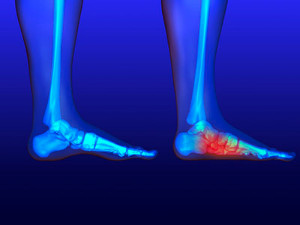
Occasionally, flat feet do not self-correct during childhood but move into adulthood, which may cause pain and discomfort. Those who enjoy working out may find their workouts are compromised as a result of living with flat feet. An effective workout for the legs consists of performing squats, and flat feet may cause the lower part of the leg to roll inward, thus affecting the benefits of this exercise. Flat feet may be improved when the foot structure is strengthened to rebuild the arch. An effective exercise that may help consists of pushing hard on the bone at the bottom of the big toe while trying to create an arch as the toe is pushed down. This is an isometric exercise when held for 20 seconds and frequently repeated. If you would like to acquire more information about how having flat feet can affect your workouts, in addition to learning about strength training foot exercises, please confer with a podiatrist who can help you with any questions you may have.
Flatfoot is a condition many people suffer from. If you have flat feet, contact Dr. Michael A. Wood from Foot Health Institute. Our doctor will treat your foot and ankle needs.
What Are Flat Feet?
Flatfoot is a condition in which the arch of the foot is depressed and the sole of the foot is almost completely in contact with the ground. About 20-30% of the population generally has flat feet because their arches never formed during growth.
Conditions & Problems:
Having flat feet makes it difficult to run or walk because of the stress placed on the ankles.
Alignment – The general alignment of your legs can be disrupted, because the ankles move inward which can cause major discomfort.
Knees – If you have complications with your knees, flat feet can be a contributor to arthritis in that area.
Symptoms
- Pain around the heel or arch area
- Trouble standing on the tip toe
- Swelling around the inside of the ankle
- Flat look to one or both feet
- Having your shoes feel uneven when worn
Treatment
If you are experiencing pain and stress on the foot you may weaken the posterior tibial tendon, which runs around the inside of the ankle.
If you have any questions please feel free to contact one of our offices located in Lansing, and Chicago, IL . We offer the newest diagnostic and treatment technologies for all your foot and ankle needs.
